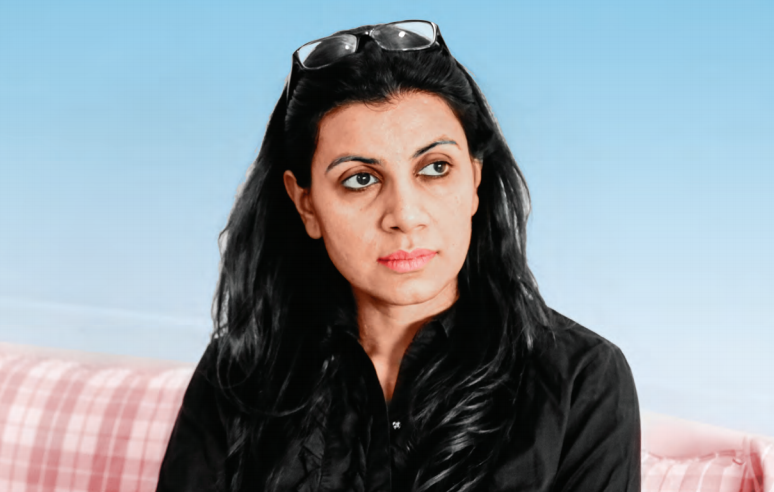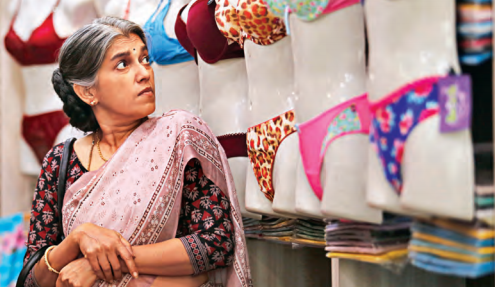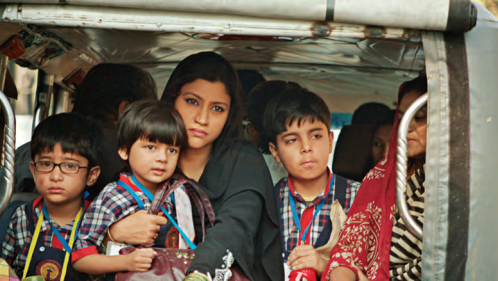Alankrita Shrivastava
India & You
May-June 2017
As Indian cinema stands at a crossroad of international glory and formulaic treatment to play to the gallery, the small matter of encroaching freedom of expression hits the headline more frequently than ever before. Where is the sensitivity, where is the patience? Why the reluctance to accept varying points of views, especially that of women?
Did you expect Lipstick Under My Burkha to create such a monumental controversy?
No, I didn’t. I was just making a film about the lives of four ordinary women, who are secretly chasing their small dreams of freedom. Besides, films like Fire, BA Pass, Qissa, Parched and Margarita, With a Straw were certified and released in the past. So, I was not expecting any issue at all.
The film got an opposite reaction abroad. What does that tell you?
The film was already travelling, when we applied for the certificate. And, I had already experienced the joy of seeing audiences from other parts of the world embracing the film.The first festival that I went to after the film got denied a certification by Central Board of Film Certification (CBFC) was Glasgow. That was quite an emotional experience. All our shows were sold out, even the early morning ones. We won the Audience Award there for the Best Film. It was just amazing. The film has screened at so many places across the world and won so many awards that I am really humbled and overwhelmed. But, in my head, the censorship issue in India and the international reception are two different things. I know I have done something right, if my tiny little film threatens the patriarchal fabric of our society. And, its feminist impulse is causing the CBFC to run scared.
The validation from the world is helping me keep my faith and courage, and enabling me to remain hopeful. It makes me feel that my struggle has a meaning and is worthwhile. And, it makes me feel that the film is universal even though it is culturally specific to India. Anyway, it is obvious that CBFC is completely patriarchal, regressive and incompetent. They have an agenda of systematically perpetuating patriarchy and silencing alternative points of view. They want to encourage only the kind of cinema that clearly represents women through the male gaze, rendering them as objects for male fulfilment, or as Goddess-like virtuous creatures, or as peripheral to the story.
The female gaze scares them. And, hence, they have refused certification to Lipstick Under My Burkha. Also, it is really interesting that they are trying to label my film as ‘pornographic’ as though there is no sex shown in Indian films. The real issue is that in my film women are trying to gain agency over their own bodies and dreams and lives. And, they themselves are telling their own intimate stories.
While films with double meaning dialogues and ‘item’ songs that completely objectify women rule the roost, the CBFC has a problem with a tiny little film about the secret lives of four ordinary women. I don’t believe in films getting banned; all films should have a level playing field. Let the adult citizens of India decide what they want to watch.
The Film Certification Appellate Tribunal (FCAT) has directed the CBFC to clear the film with adult certification, “after cutting down the length of some sex scenes”. What is your reaction to it?
I don’t believe that films should be tampered with at all. I don’t believe in censorship of any sort. But, considering the situation the film was in, when it was not getting certified at all, I think there is much cause to cheer! The FCAT, in an ideal scenario, should just have passed the film without any cut. However, they have at least understood the film and have been respectful of its context. They have not asked me to remove any scenes or alter the story. They have asked me to reduce a few seconds of sexual interaction in some scenes. And, to mute two cuss words. I worked through their request on the edit table with my editor. I did not find that it was worth my while to go to court for two cuss words and a few seconds of sex. Because the judgment is on-the-whole favourable and it criticises the CBFC’s decision, and I do not want to delay the release any further, I decided to accept it. I do hope that in the future no filmmaker has to go through this tiresome process of certification.
Have you followed the recent trends in world cinema, especially in Europe, on how they have handled the gender equality issue on screen? Where does India stand compared to that?
I’m not sure I am equipped to answer this question. Maybe, somebody who studies cinema academically and systematically will have clearer views. But I’ll try. I think world cinema has lots of interesting portrayals of women, and some wonderful women directors who do really interesting portrayals of women. The tradition of Agnes Varda, and now there are wonderful filmmakers like Andrea Arnold. Elle, which I have not seen, apparently has a really interesting portrayal of the female protagonist played by Isabelle Huppert.
In India, we have a long way to go, in terms of nuanced portrayals of women. In India, even the films with female protagonists are hit and miss. Many of them could do with more layered characters and nuanced storytelling. Also, we tend to often work with binaries – black or white, good or bad… the beauty of the shades of grey in between is often lost. We also tend to often portray the man as the saviour, even if the film has strong women characters – for instance,Pink and Dangal. A few independent films like Margarita, With a Straw tend to break the stereotype completely. While some mainstream films also try to challenge the status quo – films like Highway and Queen – much has to be achieved on-the-whole.
As you have made a very strong film with women as lead protagonists, what is your take on the representation of women and other gender minorities in mainstream Indian cinema?
I feel, there should be as many films about women as there are about men. Till then, we have a long way to go. But, having said that, I think it is also important that the gaze of the film is female. Right now, the male gaze dominates cinema. And, therefore, the portrayals of women are quite skewed. Having male characters play saviours defeats the purpose of having female protagonists. Having more films about women is step one, but when the portrayals are more sensitive, that is the second step.
Is there any taker for a more nonpatriarchal cinematic landscape? What are the challenges towards achieving that goal?
I think, the new Indian audiences will engage with a non-patriarchal cinematic landscape. But, it will take effort on everyone’s parts. Studios need to support all kinds of cinema. Distributors and exhibitors have to make an effort to move forward. Writers, directors, editors, actors, producers – everyone needs to think about the content they are creating. All parties use the convenient excuse of ‘commerce’ to justify sexist content. That has to stop. Different kinds of cinema need to be supported – cinema that looks at life through a different prism, with alternative points of view.
Do you think platforms like Cannes can be of great help in raising the much needed voice on issues such as gender sensitivity?
Cannes is the most prestigious film event of the world. But, I don’t know if the representation of women in cinema in India is of any concern to them. I think Cannes is concerned with films and auteurs from an artistic point of view. I think, women in India need to speak out, if they want a popular culture that is more gendersensitive. We need to make and watch more films that are gender sensitive. In fact, the French festival, Films de Femmes is doing fantastic work in encouraging women filmmakers from across the world. Showing my film there was a really liberating and moving experience for me. Incidentally, Lipstick Under My Burkha won the Grand Jury Prize for the Best Narrative Feature there. I really felt that they valued and treasured the female point of view. The director of the festival, Jackie Buet is a pioneer who has been championing the work of women filmmakers since the mid- 1970s. People like her are doing the real work of encouraging the female gaze. They are the unsung heroes, bravely and solidly nurturing female voices in cinema.
With the film stumbling at the domestic projection for reasons that many would find silly, how is your next project finding backers?
Lipstick Under My Burkha is my second feature. My next project is an adaptation of a Virginia Woolf book. And, I should shoot it post monsoon, hopefully. I am an independent filmmaker creating films about complex women, looking at them through the female gaze. I think, I am in the process of creating a market for my kind of films. It is hard to market my films because what I am doing is too fringe for the Indian cinematic landscape. But, I have faith that my films will find an audience because the women of India are changing.The new women of India must have a cinema that they can claim as their own. Cinema that represents them honestly, their thoughts, their dreams, their concerns, their desires. For how long will they be satisfied with unreal, strange and hollow representations of themselves? Our tribe is growing, and we will claim our space in popular Indian culture. Our films will be profitable. I have full faith in the future.
What was the idea behind choosing the particular lead cast of Lipstick Under My Burkha? Do you think as most of them have done feminist roles in the past that may have triggered the gender aspect too sharply?
I chose the lead cast because they felt right for the parts. Not for any other reason. I don’t think any actor’s past career has anything to do with the censor issue.
The Hollywood Foreign Press Association (HFPA) that conducts the Golden Globes has declared the film qualified for the Golden Globe Awards. Do you think this could help you in getting the film its desired legal recognition in India?
No, I don’t think the Indian certification system has any regard for or interest in how the film is being received internationally. So, I think the censor issue on one hand and the film winning awards at festivals or qualifying for the Golden Globes on the other hand are two entirely different things. It just feels ironic, that’s all. And it seems rather myopic on the part of the certification system in India to view a film with blinders, as though we are living in the dark ages. But, even if Lipstick Under My Burkha was not being screened across the world, it doesn’t make the censorship issue any less problematic.












